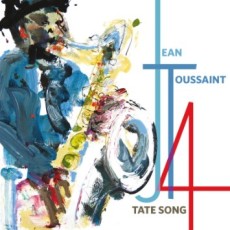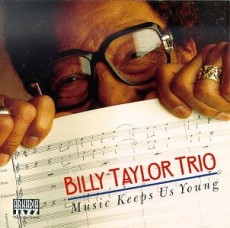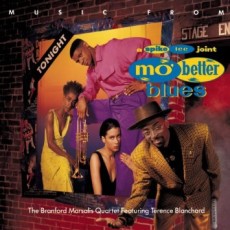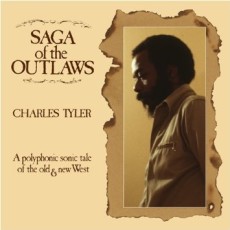
Daily Dose Of Jazz…
Ben Wolfe was born on August 3, 1962 in Baltimore, Maryland but was raised in Portland, Oregon. Early on in his career he formed a duo with Harry Connick Jr. and went on to be his musical director, recording over a dozen albums and soundtracks. He then joined the Wynton Marsalis Septet, remaining until it disbanded. This engagement was followed being an part of Diana Krall’s touring band, playing on many of her recordings, including the Grammy Award winning project When I Look In Your Eyes.
As a member of The Jazz at Lincoln Center Orchestra (JLCO), Ben has performed with Joe Henderson, Doc Cheatham, Jon Hendricks, Harry “Sweets” Edison, and Billy Higgins as well as recording with Branford Marsalis, James Moody, Eric Reed, Carl Allen, and Benny Green.
Wolfe has been awarded the 2004 New Works: Creation and Presentation Program Grant by Chamber Music America and funded through the Doris Duke Charitable Foundation. As a result he composed his extended composition Contradiction: Music for Sextet. He has also composed the score for Matthew Modine’s film short I Think I Thought.
Double bassist, composer and educator Ben Wolfe currently performs, records and teaches in the Jazz Division of the Juilliard School in New York City.
More Posts: bass

Daily Dose Of Jazz…
Jean Toussaint, born July 27, 1960 in St. Thomas, U.S. Virgin Islands and grew up in St. Thomas and New York City. He learned to play calypso as a child and attended Berklee College of Music in the late 1970s, studying under saxophonist Billy Pierce.
In 1979 Jean formed a group with Wallace Roney and from 1982 to 1986 was a member of Art Blakey and The Jazz Messengers alongside Terence Blanchard, Donald Harrison, Mulgrew Miller and Lonnie Plaxico. With Blakey he recorded three studio albums, including New York Scene, which won a Grammy for Best Jazz Instrumental Performance.
Toussaint moved to London in 1987, following an invitation from Professor of Jazz, Lionel Grigson, to be artist-in-residence at the Guildhall School of Music. Since then he has maintained a consistent profile as a band leader in the UK and Europe, playing with British musicians who include, among others, Steve Williamson, Courtney Pine, Julian Joseph, Jason Rebello and Cleveland Watkins.
He has also performed in the groups led by McCoy Tyner, Gil Evans, Kirk Lightsey, Cedar Walton, Max Roach, Horace Silver, Jeff “Tain” Watts, and has collaborated with Lionel Loueke. Soprano and tenor saxophonist Jean Toussaint has compiled a catalogue of ten albums as a leader with his latest release being Tate Song for Lyte Records. He continues to perform and record.
More Posts: saxophone

Daily Dose Of Jazz…
William “Billy” Taylor was born July 24, 1921 in Greenville, North Carolina but his family moved to Washington, DC when he was five years old. Growing up in a musical family, learning to play guitar, drums and saxophone as a child but most successfully on the piano. He took classical piano lessons with Henry Grant, who had educated Duke Ellington a generation earlier.
His first professional appearance was playing keyboard at the age of 13 and was paid one dollar. He attended Dunbar High School, the U.S.’s first high school for African-American students. He went to Virginia State College, majored in sociology but pianist Dr. Undine Smith Moore noticed young Taylor’s talent on piano, changed his major to music, graduating with a degree in music in 1942.
After graduation a move to New York City saw Billy playing piano professionally from 1944, first with the Ben Webster Quartet on 52nd Street. He met Art Tatum the same night, who became his mentor. He went on to perform with Machito developing his love for Latin music, a tour of Europe with the Don Redman Orchestra, and remained to work Paris and the Netherlands. Retuning to New York he worked with Bob Wyatt, Sylvia Sims and Billie Holiday in a successful show called Holiday on Broadway. A year later, he became the house pianist at Birdland performing with Charlie Parker, J. J. Johnson, Stan Getz, Dizzy Gillespie and Miles Davis. He would become the longest playing pianist ever in the history of the club.
In 1949, Taylor published his first book, a textbook about bebop piano styles. In 1952 Taylor composed one of his most famous tunes, I Wish I Knew How It Would Feel To Be Free, which subsequently achieved more popularity with the civil rights movement of the 1950s and 1960s. Nina Simone covered the song in her 1967 album Silk & Soul and the instrumental is used by the BBC for it’s long running television Film program.
Billy made dozens of recordings in the 1950s and 1960s, had a thriving broadcast career and in 1958, he became the Musical Director of NBC’s The Subject Is Jazz, the first ever television series focusing on jazz. The then new National Educational Television Network (NET) produced the 13-part series that hosted Duke Ellington, Aaron Copland, Bill Evans, Cannonball Adderley, Jimmy Rushing and Langston Hughes and others.
He founded the Jazzmobile in 1961 providing an arts education program via workshops, master classes, lecture demonstrations, arts enrichment programs, outdoor summer mobile concerts, special indoor concerts and special projects. Taylor worked as a DJ and program director on New York radio station WLIB, his trio was a regular feature of the Hickory House on West 55th Street, and from 1969 to 1972 became the first Black American to be musical director and lead a talk show band on The David Frost Show.
By the Eighties the Jazzmobile was producing shows for National Public Radio, receiving a Peabody Award for Excellence in Broadcasting Programs. In 1981, after being profiled by CBS News Sunday Morning he was hired as an on-air correspondent and conducted more than 250 interviews with musicians. He received an Emmy Award for his segment on Quincy Jones. These are just two of the many awards he has received over the course of his career.
By the end of the decade he formed his own “Taylor Made” record label to document his own music. In 1997, he received the New York state governor’s art award. Suffering from a stroke in 2002 that affected his right hand did not stop him from performing almost until his death. He died after a heart attack on December 28, 2010, in Manhattan, at the age of 89. His legacy was honored in a Harlem memorial service on January 11, 2011, featuring performances by Taylor’s final working trio – bassist Chip Jackson, drummer Winard Harper and long-time Taylor associates Jimmy Owens, Frank Wess, Geri Allen, Christian Sands and vocalist Cassandra Wilson.
More Posts: piano

Daily Dose Of Jazz…
Bill Lee was born William James Edwards Lee III on July 23, 1928 in Snow Hill, Alabama the son of Alberta Grace Edwards, a concert pianist, and Arnold Wadsworth Lee, a musician. A bassist by profession, he is also a composer, arranger and conductor.
Bill scored his son’s first four movies, and was also the musical director and performer Sonny Darling in She’s Gotta Have It, the bassist in the Phyllis Hyman Quartet and the music conductor of the Natural Spiritual Orchestra for School Daze and Do The Right Thing, and appeared as Father of the Bride and also the music director for Mo’ Better Blues.
Lee was arrested in 1991 during a police drug sweep for heroin possession, fell out with his son, Spike Lee, over the arrest and subsequent interracial marriage to second wife that took place shortly after his first wife Jacquelyn, Spike’s mother, passed away from cancer. Bad blood continued as Spike made Jungle Fever that set a negative light on White/Black romantic relationships.
Along with Stuart Scharf he was the music arranger for the stage play A Hand is on the Gate. He has appeared on the Today Show, the Harry Belafonte television specials, has composed operas, stage music for the Apollo Theatre and has recorded with The Brass Company, Stanley Cowell, Richard Davis, Clifford Jordan, Harold Mabern, Pat Martino, Johnny Griffin, Aretha Franklin, Bob Dylan, Odetta, Judy Collins, Gordon Lightfoot and Peter, Paul and Mary among others. Double bassist and bass guitarist Bill Lee continues to compose, arrange and conduct.

Daily Dose Of Jazz…
Charles Lacy Tyler was born on July 20, 1941 in Cadiz, Kentucky and spent his childhood years in Indianapolis, Indiana. He played piano as a child and clarinet at 7, before switching to alto in his early teens, and finally settled with the baritone saxophone. During the summers, he visited Chicago, New York City and Cleveland, Ohio that he met the young tenor saxophonist Albert Ayler at age 14.
After a stint in the army from 1957–1959, Tyler relocated to Cleveland in 1960 and began playing with Ayler, commuting between New York and Cleveland. During that period he got to jam with Ornette Coleman and Sunny Murray. In 1965 he recorded with Ayler’s group Bells and Spirits Rejoice.
Charles recorded his first album as leader in 1966 for ESP-Disk, returned to Indianapolis to study with David Baker at Indiana University between 1967 and 1968, then recorded a second album for ESP titled Eastern Man Alone. In 1968 he transferred to the University of California, Berkeley to study and teach. In Los Angeles, he worked with Arthur Blythe, Buddy Bradford and David Murray before heading back to New York in 1974, to lead his own freebop groups with Blythe, trumpeter Earl Cross, drummer Steve Reid and others.
During this period he recorded on his Akba label the album Voyage from Jericho. By 1975, Tyler enrolled at Columbia University and made an extensive tour of Scandinavia releasing his second Akba album Live in Europe. The next year he performed the piece Saga of the Outlaws at Sam Rivers’ Studio Rivbea that was released two years later. He would go on to perform sideman or co-leader duties with Steve Reid, Cecil Taylor, Hal Russell, Wilbur Morris and Billy Bang.
In 1982, during a European tour with the Sun Ra Orchestra, he relocated to Denmark and three years later moved to France, recording with other expatriates like Khan Jamal in Copenhagen and Steve Lacy in Paris. Free jazz alto and baritone saxophonist CharlesTyler died in Toulon, France of heart failure on June 27, 1992.
More Posts: saxophone


